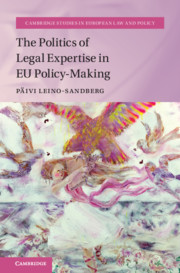Book contents
- The Politics of Legal Expertise in EU Policy-Making
- Cambridge Studies in European Law and Policy
- The Politics of Legal Expertise in EU Policy-Making
- Copyright page
- Dedication
- Contents
- Foreword
- Acknowledgements
- Table of Cases
- Table of Treaties, Legislation and Institutional Sources
- 1 Introduction
- 2 Who Are EU Legal Advisers?
- 3 What Do EU Legal Advisers Do?
- 4 Confidentiality of Legal Advice
- 5 The Commission Legal Service
- 6 Legal Advice in Council Decision-Making
- 7 Legal Advice in the European Parliament
- 8 Epilogue
- Bibliography
- Index
4 - Confidentiality of Legal Advice
Published online by Cambridge University Press: 16 September 2021
- The Politics of Legal Expertise in EU Policy-Making
- Cambridge Studies in European Law and Policy
- The Politics of Legal Expertise in EU Policy-Making
- Copyright page
- Dedication
- Contents
- Foreword
- Acknowledgements
- Table of Cases
- Table of Treaties, Legislation and Institutional Sources
- 1 Introduction
- 2 Who Are EU Legal Advisers?
- 3 What Do EU Legal Advisers Do?
- 4 Confidentiality of Legal Advice
- 5 The Commission Legal Service
- 6 Legal Advice in Council Decision-Making
- 7 Legal Advice in the European Parliament
- 8 Epilogue
- Bibliography
- Index
Summary
Legal advice given in the EU context has traditionally enjoyed high levels of confidentiality. In most cases, it has been virtually invisible. EU institutions have insisted on the need for such confidentiality, justifying it as a means of safeguarding their ‘legitimate ability to seek and receive frank, objective and comprehensive legal advice’. The institutional belief in the detrimental effects of disclosure of legal advice has led to highly restricted policies regarding access to legal opinions in all EU institutions. These policies have been increasingly under attack from proponents of a public interest in more openness, in particular in legislative matters. These critics have lately found their champion in the Court, especially when it comes to legislative content. Chapter 4 deals with the confidentiality of EU legal advice, but also related questions about the audience of the Legal Services. Do legal advisers only serve the institution that employs them, or should they also be in the service of a broader public interest in preserving the integrity of the law? Considering the significance of their work for EU development, should their views on the limits of EU law be generally available to a broader audience?
- Type
- Chapter
- Information
- The Politics of Legal Expertise in EU Policy-Making , pp. 99 - 136Publisher: Cambridge University PressPrint publication year: 2021

